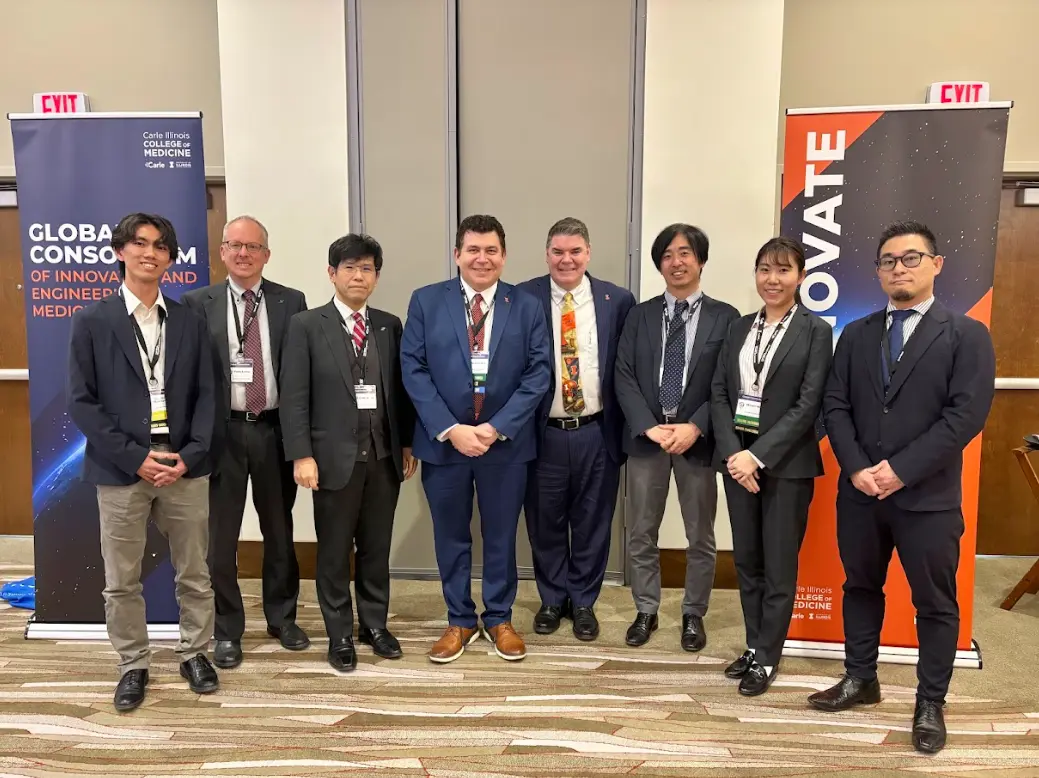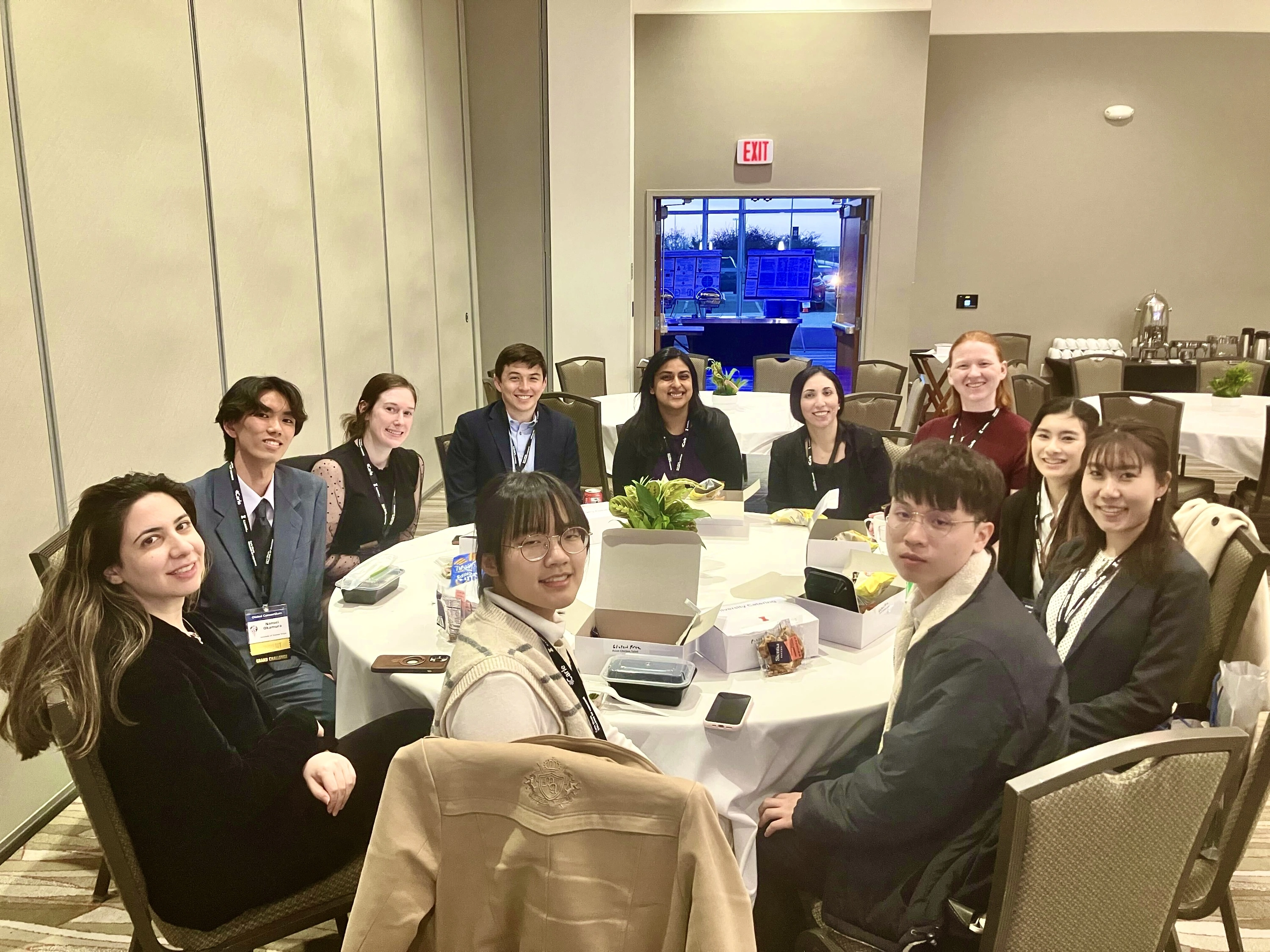At the first Global Summit of the Global Consortium of Innovation and Engineering in Medicine
Minori Aoki, Nansei Okamura
Faculty of Medicine

From April 6-8, a delegation from Science Tokyo participated in the first Global Summit of the Global Consortium of Innovation and Engineering in Medicine (GCIEM) hosted by Carle Illinois College of Medicine at the University of Illinois Urbana-Champaign (UIUC) campus.
The consortium, of which Science Tokyo is a founding member, involves academic institutions, healthcare organizations, and industry leaders, and aims to “revolutionize medicine through engineering-based solutions to health problems across the globe.” More than 500 delegates from 33 institutions worldwide attended the 2025 summit.
Among them were medical and engineering students competing in a “Global Health Innovation Grand Challenge Competition,” including two from Science Tokyo: fourth-year medical student Minori Aoki and third-year medical student Nansei Okamura. Both students are members of GCIEM’s Student Committee, where students from around the world engage in collaborative projects and discuss new developments in medicine. They also participated in the “Grand Challenge” as part of mixed teams composed of students from different medical schools. Here are their reports on their experience.
Minori Aoki
For the past year, I have served as the co-chair of the Student Committee, a role that has allowed me to connect with peers from around the world who share a passion for innovation in medicine. Through our regular meetings, we have created a platform for medical and engineering students to share events and opportunities and stay informed about global developments in our fields.
At the Global Summit, I finally met many of my fellow Executive Council and Student Committee members in person. It was an energizing experience, filled with thought-provoking discussions. Before attending, I often wondered: “Why are knowledge and application of engineering necessary for the future of medicine?” But during the summit, I found many specific answers to this question through talking to other students, listening to presentations on topics such as AI-based imaging analysis, and participating in the “Grand Challenge” competition.
“AI will not replace human doctors, but doctors who can use AI will replace those who cannot” was a sentence I heard repeatedly. It made me realize the importance of the research emphasizing medical-engineering collaboration that Institute of Science Tokyo is currently pursuing.
At the Carle Illinois College of Medicine (CI MED) at UIUC, there is a required project at the end of each clinical block where students research clinical challenges in that field, select one, and develop a concrete solution along with a business plan. The “Grand Challenge” at the summit was related to this project. Student teams competed to pitch ideas to the judges concerning innovative solutions to real-world problems. My team presented on imaging diagnosis of endometriosis, and my teammates from CI MED were full of ambition and ideas. One is raising three children, and she told me how she manages being a mother as a medical student. The other plans to take a gap year after graduation to focus on research and become a more competitive candidate for residency. Their determination was truly inspiring.
Our team did not make the finals, but the teams that did were very impressive in terms of their perspective, prototype test results, business model potential, and presentation skills. The winning team, for example, designed a patch to place on the skin that provides personalized treatments for hormone imbalance problems that women going through menopause suffer. This group won $75,000 (more than 10,000,000 yen) in funding to pursue their idea.
Going forward, I would like to create opportunities for collaborative projects between engineering students and researchers within the Student Committee. I also hope that one day a Science Tokyo team can win the Grand Challenge.
Nansei Okamura
Participating in the 2025 Global Summit, particularly the Grand Challenge, was both inspiring and challenging for me. My team’s idea concerned therapeutic hypothermia for acute stroke management. Once someone has a stroke, every minute counts. If they do not receive treatment within 4.5 hours, it can be too difficult to recover. Stroke victims in rural areas are often not treated in time. Our group, led by CI MED students, came up with a fascinating way to solve this problem via a device that can potentially lower the body temperature enough to add crucial minutes or even hours to the treatment window. We did not reach the final stage, but it was inspiring to see students of the same age as me being so active.
In the future, I would like to form an on-campus team to promote medical-engineering collaboration at the student level. I believe the first step is to create opportunities for students from engineering and medical/dental fields to interact. Let’s work together and someday win the Grand Challenge!
The students would like to express their gratitude to everyone at Science Tokyo and UIUC who helped make their experience possible.

Contact
- Remarks
- 【Organization name】 Planning and Coordinating Group, International Division
【Address】S6-6, 2-12-1 Ookayama, Meguro-ku, Tokyo 152-8550, Japan
【Email】 sciencetokyo.global@adm.isct.ac.jp
【Tel】 +81-3-5734-2982